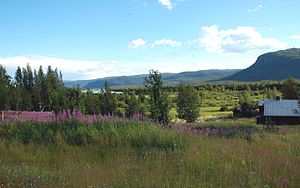Kvikkjokk
You can help expand this article with text translated from the corresponding article in Swedish. (July 2010) Click [show] for important translation instructions.
|
Kvikkjokk | |
|---|---|
 | |
| Coordinates: 66°57′N 17°43′E / 66.950°N 17.717°E | |
| Country | Sweden |
| Province | Lapland |
| County | Norrbotten County |
| Municipality | Jokkmokk Municipality |
| Population (2007) | |
| • Total | 16 |
| Time zone | UTC+1 (CET) |
| • Summer (DST) | UTC+2 (CEST) |
Kvikkjokk (Swedish pronunciation: [ˈkvɪ̌kːjɔk])[1] (Lule Sámi: Huhttán)[2] is a small village situated in Jokkmokk Municipality, Norrbotten County, Sweden. It is located 120 km northwest of Jokkmokk.[3] Several hiking trails start in Kvikkjokk. Kungsleden passes through the village and it is a popular starting point for hikers going into Sarek National Park.
Etymology
[edit]The name derives from the Lule Sámi Kuoi'hka-johko "gushing river" which is another name for the river Gamájåhkå ("river as murky as reindeer milk's whey"). The modern Sámi name Huhttán derives from the ore smelting hut which once stood in the village, the Swedish word for 'the hut' being hyttan.[4]
History
[edit]The Kvikkjokk area is traditionally Sámi. The first Swedish settelment in the area came after 1659 when it became known that silver was present in the nearby mountain Silbbatjåhkkå (Kedkevare). The first smelting began in 1662 and in 1672 mining was expanded also to the mountain Álggávárre (Alkavare). The mines and huts were collectively known as Luleå Silververk (Luleå Silverworks). The settlement steadily grew until 1702 when production stopped, leading to the vast majority of the Swedish population leaving the settlement. Left were only the priest and bell-ringer. Only near the end of the 1700s did any new settlers begin coming me to the area.[5]
Climate
[edit]Kvikkjokk has a subarctic climate (Köppen Dfc). It is one of the most continental climates of the Nordics, with 20 °C (68 °F) summer highs and −20 °C (−4 °F) winter lows in terms of averages. Areas to its north that share the proximity to the Norwegian border have greater maritime moderation with milder winters and quite a bit cooler summers. Kvikkjokk instead is quite reminiscent of Lapland's largest town Kiruna in terms of climate, only with wider temperature swings. The record low temperature of −43.6 °C (−46.5 °F) was registered on 3 January 2024.[6][7]
| Climate data for Kvikkjokk–Årrenjarka (2002–2022 averages); extremes since 1901 | |||||||||||||
|---|---|---|---|---|---|---|---|---|---|---|---|---|---|
| Month | Jan | Feb | Mar | Apr | May | Jun | Jul | Aug | Sep | Oct | Nov | Dec | Year |
| Record high °C (°F) | 9.0 (48.2) |
9.0 (48.2) |
12.0 (53.6) |
17.4 (63.3) |
27.2 (81.0) |
30.9 (87.6) |
33.1 (91.6) |
29.1 (84.4) |
24.2 (75.6) |
16.0 (60.8) |
12.8 (55.0) |
9.5 (49.1) |
33.1 (91.6) |
| Mean maximum °C (°F) | 3.9 (39.0) |
5.4 (41.7) |
7.2 (45.0) |
12.1 (53.8) |
20.3 (68.5) |
25.2 (77.4) |
26.9 (80.4) |
24.8 (76.6) |
18.4 (65.1) |
11.5 (52.7) |
5.7 (42.3) |
4.7 (40.5) |
28.3 (82.9) |
| Mean daily maximum °C (°F) | −10.0 (14.0) |
−7.2 (19.0) |
−0.8 (30.6) |
5.0 (41.0) |
10.7 (51.3) |
16.8 (62.2) |
20.1 (68.2) |
17.6 (63.7) |
11.6 (52.9) |
4.0 (39.2) |
−3.4 (25.9) |
−6.4 (20.5) |
4.8 (40.7) |
| Daily mean °C (°F) | −14.9 (5.2) |
−12.7 (9.1) |
−6.8 (19.8) |
−0.4 (31.3) |
5.2 (41.4) |
11.0 (51.8) |
14.3 (57.7) |
12.0 (53.6) |
7.0 (44.6) |
0.2 (32.4) |
−7.1 (19.2) |
−11.3 (11.7) |
−0.3 (31.5) |
| Mean daily minimum °C (°F) | −20.0 (−4.0) |
−18.1 (−0.6) |
−12.9 (8.8) |
−5.8 (21.6) |
−0.4 (31.3) |
5.1 (41.2) |
8.5 (47.3) |
6.4 (43.5) |
2.4 (36.3) |
−3.6 (25.5) |
−10.8 (12.6) |
−16.1 (3.0) |
−5.4 (22.2) |
| Mean minimum °C (°F) | −35.1 (−31.2) |
−34.5 (−30.1) |
−29.0 (−20.2) |
−19.4 (−2.9) |
−7.1 (19.2) |
−2.0 (28.4) |
1.3 (34.3) |
−0.9 (30.4) |
−5.0 (23.0) |
−14.3 (6.3) |
−23.8 (−10.8) |
−30.8 (−23.4) |
−37.6 (−35.7) |
| Record low °C (°F) | −43.6 (−46.5) |
−42.5 (−44.5) |
−39.0 (−38.2) |
−30.0 (−22.0) |
−19.0 (−2.2) |
−6.6 (20.1) |
−3.0 (26.6) |
−4.5 (23.9) |
−10.5 (13.1) |
−25.6 (−14.1) |
−35.7 (−32.3) |
−40.4 (−40.7) |
−43.6 (−46.5) |
| Average precipitation mm (inches) | 42.7 (1.68) |
35.1 (1.38) |
24.1 (0.95) |
22.2 (0.87) |
41.1 (1.62) |
54.2 (2.13) |
90.2 (3.55) |
71.7 (2.82) |
59.1 (2.33) |
45.4 (1.79) |
42.6 (1.68) |
49.2 (1.94) |
577.6 (22.74) |
| Average extreme snow depth cm (inches) | 75 (30) |
89 (35) |
85 (33) |
76 (30) |
36 (14) |
0 (0) |
0 (0) |
0 (0) |
0 (0) |
11 (4.3) |
33 (13) |
59 (23) |
95 (37) |
| Source 1: SMHI Open Data[8] | |||||||||||||
| Source 2: SMHI climate data 2002–2022[9][7][6] | |||||||||||||


References
[edit]- ^ Jöran Sahlgren; Gösta Bergman (1979). Svenska ortnamn med uttalsuppgifter (in Swedish). p. 15.
- ^ "Ortnamn lulesamiskt område". Sametinget (in Swedish). Retrieved 2024-10-28.
- ^ "Kvikkjokk". Nationalencyklopedin (in Swedish). Retrieved 1 August 2010.
- ^ Collinder, Björn (1964). Ordbok till Sveriges lapska ortnamn [Dictionary over Sweden's Lappish place names] (in Swedish).
- ^ Awebro, Kenneth (1983). Luleå silververk: ett norrländskt silververks historia [Luleå Silverworks: the history of a Norrland silverwork] (in Swedish).
- ^ a b Ebba Torstensson, Ebba (January 3, 2024). "Kallaste januarinatten på 25 år". aftonbladet.se. Aftonbladet. Retrieved January 4, 2024.
- ^ a b https://twitter.com/Ventuskycom/status/1742457772690555003 [bare URL]
- ^ "Öppen Data för Kvikkjokk-Årrenjarka" (in Swedish). Swedish Meteorological and Hydrological Institute. Archived from the original on 2019-04-11. Retrieved 2019-05-16.
- ^ "SMHI climate data 2002–2022" (in Swedish). SMHI. 5 March 2023.


